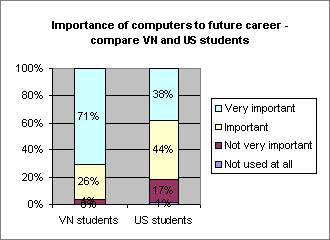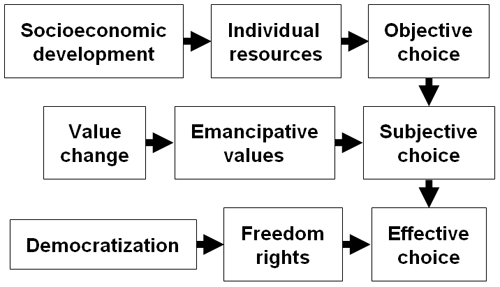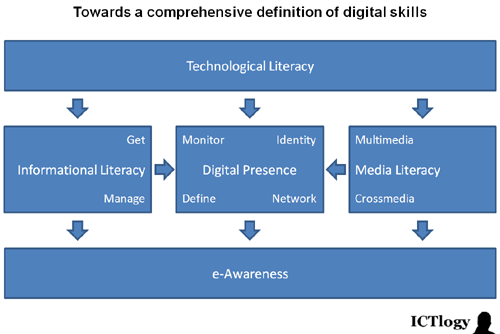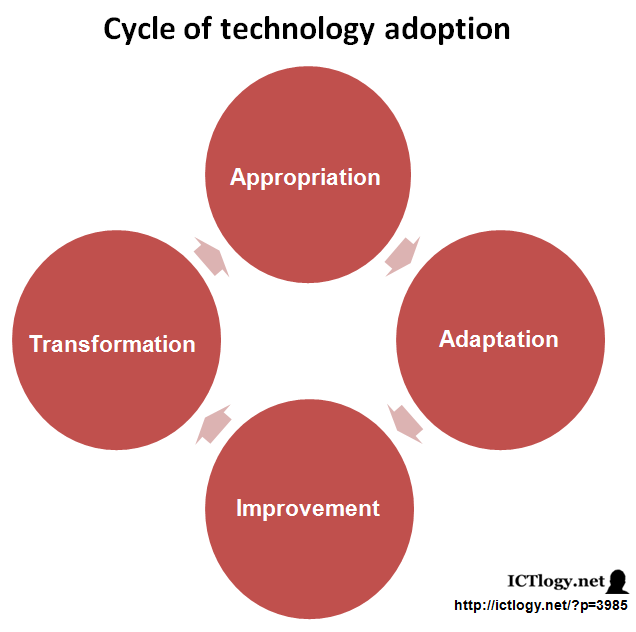By Ismael Peña-López (@ictlogist), 30 September 2012
Main categories: ICT4D
2 Comments »
Every now and then we hear about new technologies, Information and Communication Technologies or the latest gadget revolutionizing or deeply transforming institutions as we know them. Laptops will transform Education and Twitter will revolutionize democracies (and non-democracies too).
I may well be that some of these technologies or tools end up capsizing our worlds, but it is usually not so. Indeed, revolutions or transformations are a matter of attitudes, which many times can be driven by aptitudes.
Welzel, Inglehart & Klingemann describe in The theory of human development: A cross-cultural analysis three stages towards full human development:
We can consider the “objective choice” as having the appropriate resources and tools to achieve a material level of development. Or, better said, the material tier to achieve full development. New technologies, Information and Communication Technologies or the latest gadget totally fit in this category. And they might be necessary conditions, but surely not sufficient ones.
The second tier focuses in the subjective choice, that is, in wanting or being personally able to foster developmental change. Having a civic centre in your neighbourhood is to the objective choice what having the will to participate in community activities is to subjective choice. Of course, the subjective choice is strongly related with education and culture.
In a knowledge society, education strongly correlates with digital literacy, understood in a very broad and comprehensive manner. In From laptops to competences: bridging the digital divide in higher education I presented the following scheme to a comprehensive approach to digital literacy (and which I later put into practice in Analyzing digital literacy with a single simple tweet):
On the other hand — and as it was described in Personal Learning Environments as conscious learning strategies — we can consider four stages in the cycle of technology adoption:
Briefly put:
- Appropriation: you learn how to use the technology (e.g. you learn to write in MS Word).
- Adaptation: you substitute your old technology for the new one, but you still do the exactly same things (e.g. you get rid of you typewriter and use MS Word instead).
- Improvement: your technology allows you to perform some new tasks, or the old ones in a more efficient way (e.g. you use the track changes and commenting feature of MS Word to let others collaborate with your original document)
- Transformation: the way things worked changes radically because of technology (e.g. you use a wiki to create a collaborative document, shared online and edited in real time with videoconference support).
If we put side to side the Cycle of Technology Adoption with the comprehensive model of digital skills, we end up with quite a handy comparison:
Chance or not, the way the comparison is built shows how appropriation requires technological literacy and a little bit of informational literacy. That is, to lean how to use a specific ICT tool it does not suffice with knowing how to operate it, but also knowing its relationship with information. I know the comparison could be built in many other ways and these “conclusions” vary quite a lot, but what is shown is interesting to say the least. In this very same train of thought, adoption (getting rid of old technology) implies full informational skills plus some media literacy. When it comes to improvement, it cannot be done without taking into account that digital presence (digital identity, digital personna, etc.) is a crucial part of this new communicational landscape that a Knowledge Society is.
But we began talking about transformation of institutions by means of technology.
It should surprise anyone that transformation requires e-awareness, that is, the competence to be aware, acknowledge and understand how the world — as a whole and as your own microcosmos — is changing and will keep on changing because of the impact of Information and Communication Technologies. Without this understanding, it is almost impossible to transform anything. Without the a comprehensive awareness of the impact of ICTs it is very unlikely that one can transform anything at all (least a institution such as Education or Democracy) by means of ICTs.
Of course, there is always room for chance and luck. But the next time that it is stated that “technology X will transform Democracy” or that “the device Y will transform Education”, a necessary question should follow: does the general usage of this technology or device aligns with a full awareness of the impact of ICTs in the field? does the fosterer of such technology or device has full awareness of the impact of ICTs in the field?
Most of the times, the answers will be “no” and, thus, the specific technology or device will not be transformative. Don’t get me wrong: improvement is just great.
By Ismael Peña-López (@ictlogist), 20 October 2008
Main categories: Digital Divide, e-Government, e-Administration, Politics, e-Readiness, ICT4D, Meetings
Other tags: egov_epfl
No Comments »
These are the materials I used on a seminar belonging to the Executive Master in e-Governance organized by the École Polytechnique Fédérale de Lausanne and partnered by the Universitat Oberta de Catalunya.
ICTs, development and government: from e-Readiness to e-Awareness
Presentation
Recommended Readings
Assignment
Take your home country as the basis.
Describe the strengths and weaknesses of this country in the following five fields:
- Infrastructures
- ICT Sector
- Digital Literacy
- Content and Services
- Legal Framework
and relate them to what you think is critical to establish a full range of operational e-Government initiatives (basic, intermediate and advanced levels).
Evaluation criteria:
- Identification of main/critical aspects
- Depth of analysis, conclusions backed with data/evidence…
- Use (and citation) of appropriate and complementary references
- Quality of exposition, structure, clarity of language…
Where to start from:
More information
By Ismael Peña-López (@ictlogist), 20 November 2007
Main categories: Digital Divide, Digital Literacy, e-Government, e-Administration, Politics, e-Readiness, ICT4D
Other tags: egov_epfl
No Comments »
Today I imparted a seminar belonging to the Executive Master in e-Governance organized by the École Polytechnique Fédérale de Lausanne and partnered by the Universitat Oberta de Catalunya.
General information
I just want to thank the attendants to the course for being such an interesting audience and for making me think because of their witty questions.
Syllabus
Information and Communication Technologies for Development: ICT4D
- Food or computers?
- Efficacy, efficiency
- Leapfrogging Development
- Second Bests
- Endogenous development
The concept of access and the measurement of the Knowledge Society
- The Telecommunications Model: limitations
- The Broadcasting Model: limitations
- Access vs. Ownership: different solutions
- Access vs. use
Digital Divide: a holistic approach
- A five tier model
- Old and new divides
- Hardware
- Software
- The broadband divide
- Informational Literacy
- Content and Intellectual Property
- e-Awareness and the leadership divide
e-Readiness and Web 2.0 for e-Governance in Developing Countries
- e-Participation and e-Democracy
- Censorship circumvention and freedom of speech
- Transparency and accountability
- Law enforcement
- Open Access and access to knowledge
Slides
Recommended Bibliography
By Ismael Peña-López (@ictlogist), 27 June 2007
Main categories: Digital Divide, Digital Literacy, ICT4D
No Comments »
The results of the Project Internet Catalonia, directed by , were presented yesterday at the Open University of Catalonia headquarters. Actually, it was just a formal presentation, as the [reports] are to be made public and available to everyone […] between October 2007 to January 2008.
Nevertheless, professors Castells and Imma Tubella, directors of the project, gave some highlights of their (40 researchers were involved) main findings.
Under my point of view — and own interests, of course — there are two important statements that would explain both successes and failures in the field of Information and Communication Technologies for Development, digital (il)literacy, and digital content and services use:
The study shows that the more independent and capable people are in developing projects, the more they will use the internet. And the more they use the internet, the more autonomy they can achieve.
- The Internet
[…]requires some educational level
, because we live in an uninformed Information Society, and this will not be solved by the Internet
. The Internet deepens a historical divide: the educational
: It is not just a matter of access, but to receive the appropriate education to know what for and how to use the Internet
Put short: ICTs are catalysts and multipliers. Capable people — and developed countries — will find an amazing tool to boost their abilities and the reach and scope of their energies. Illiterate will enter new — digital — illiteracies that will make them opt out of something they don’t understand or find useful at all, widening the gap of their illiteracy, unpowering — impoverishing — them.
Hence, the role of education is more important than ever — let aside health and economic development, of course — and the teaching staff is the key element in the incorporation of the internet into school education
, but the scenario is quite sad:
the presence of internet in the classroom is very low in comparison to the use made of it by teachers and students outside of school
the majority of computers with an internet connection were to be found in the computer studies classrooms to which students had much less access than they did to their own classroom
until very recently teachers tend to use the internet to maintain the traditional teaching patterns, rather than trying to use it to innovate
a good number of school directors do not prioritise the integration of ICT and the internet for educational ends
This is something I wrote about in my post Nativos Digitales [Digital Natives — post in Spanish] at the Educación y Cultura [Education and Culture] blog, were I stated that:
It’s likely that one of the steps we have to make, as teachers — but also as parents, as education begins (or should begin) at home —, is accelerating our “nationalization” in the digital world: we’ll always have the accent of our mother tongue, but only by speaking in the same language understanding will become possible. And, let’s face it, digital natives will not learn a dead language, ours, the one of letters and mail, phone calls, or incunable facsimile editions with yellowish pages.
By Ismael Peña-López (@ictlogist), 22 June 2007
Main categories: Digital Divide
No Comments »
In 2005, the e-Divide Team carried on a survey and compared computer use among US and Vietnamese students. They found that that Americans did use computers more frequently at home and at schools. One of the reasons might perfectly be that even if the proportion of students having one computer at home almost equal among US and Vietnamese students, most of these computers in the US where connected to the Internet, while more than half of the Vietnamese where not. When looking at computer availability at the school, 92% of American students almost never had problem to access computers at school, vs. only 21% Vietnamese.
So far, the charts bring no big news. But the following one is really interesting:

Source: e-Divide!
The authors of the survey read these data this way:
Awareness of the role of computers in the future
Most students at Pinkerton Academy think that computers are important for their future career. However, Vietnamese students have much higher awareness of this issue. While only 38% of American students think that computer is very important to their future career, this number is 70% in Vietnamese students.
One explanation for this way of thinking is that while computer use “wouldn’t make a difference” for any American, digital literacy in Vietnam really can, as we have seen in Bangladesh or India’s Bangalore, where — among others — offshoring of coding routines to these countries have hugely impacted local economies and created the emergency of new middle classes based on the IT Industry.
But I’d rather explore a second explanation. In 1987, Robert Solow stated his famous aphorism You can see the computer age everywhere but in the productivity statistics
, known as the Solow Paradox. These “invisibility of computers” has sometimes been related to the “invisibility of technology”: some technologies (i.e. electricity) have become so natural that have become factually invisible, hence you click on the switch and don’t see light coming out of a miracle. Thus, computer are so perfectly integrated within productive processes that have become invisible for statistics.
Under this point of view, the question is: who is, really, more aware of computer’s impact on one’s career: Vietnamese students, 71% of whom state that computers are very important
to their future career? or American students, which for a 62% of whom computers have already become invisible?
To stress this last point, let’s remember that Vietnam ranked 178th (out of 181) in the Digital Opportunity Index for year 2006 and had just 23% of the value of the US score to the ICT Opportunity Index for the same year (76.66 vs. 322.73). To make things simpler, let’s consider a country with almost 100% literacy (not digital, but just read and write), and another country ranking quite poor in this aspect. And let’s put the former question under this new approach: Importance of being able to read and write to future career?
. In the first country, the highly literate, no one would even consider saying that being able to read and write makes any difference, as everyone is supposed to be able to, hence you’ll be judged by other skills. In the second country, literate people would consider, on the contrary, that this is a highly valuable skill.
Yet another example. Put it in another scenario: all in all, who’s got more e-Awareness? Digital Immigrants or Digital Natives?
By Ismael Peña-López (@ictlogist), 18 May 2006
Main categories: Digital Divide, e-Readiness, ICT4D, Meetings
1 Comment »
Though it is designed as an open debate among students and the speaker, I’m giving unilaterally a name to the second seminar I’m imparting in Trento — From e-Readiness to e-Awareness (or the way back) — just to give an idea about what I guess it is going to deal with. I was asked by the organization to please suggest some basic bibliography for the students to read and prepare some questions so the debate could be started.
I here present v2.0 of my initial list, somehow improved (or impovered, yours to judge) with 3 more references. There it goes:
I’d like to add to these my following posts:
From all of these, Tongia et al. is quite long and specific (but interesting enough to be in this list). The other ones I think they are accessible to any kind of learner.

 The concept of human development
The concept of human development


 , 1.6 MB)
, 1.6 MB)
